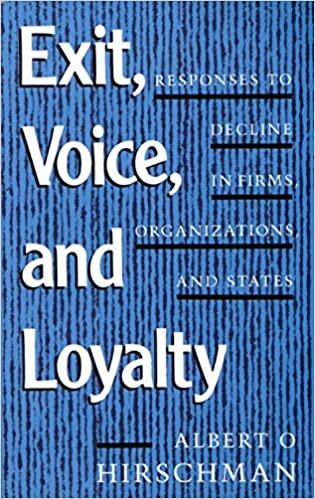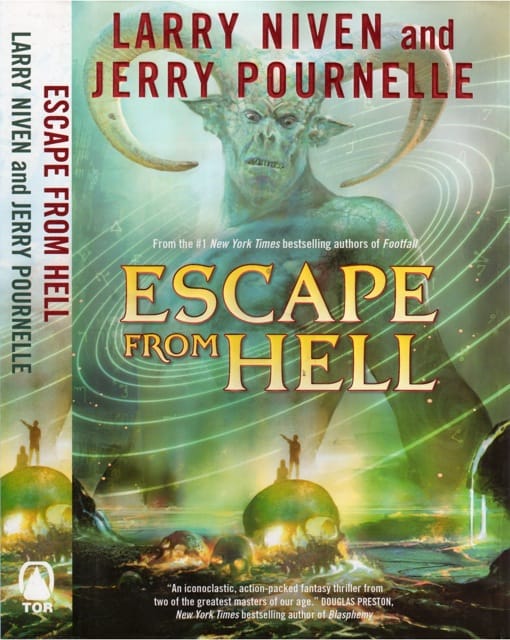The Long View 2008-04-09: Entry Rights; WWZ film; Favorite Books; Quellos

John J. Reilly starts this entry off by looking at entry rights for migrants. Exit, with a capital E, the ability to leave whatever system you find yourself in, is an idea that is often contrasted with Voice, the attempt to change that system. In this case, the authors of the paper John cites, Somin and McGinnis, are arguing there must be a corresponding ability to enter somewhere else for Exit to really work.
This interested John because he noted that universal states often had policies that encouraged internal migration within the oecumene, which acted both as a safety valve and a method to prevent the formation of nations that could rebel. John also noted that Catholic teaching favored rights to emigrate and immigrate, but reserved the ability of the receiving state to regulate and limit inflows.
John also notes an interesting book poll done by Harris. In that poll, which simply asked what is your favorite book of all time, turned up the differing preferences of men and women when it comes to books. In 2008, both men and women selected the Bible as their favorite book most often [something still true in 2014], but the second favorite diverged sharply. In a humorous coincidence, men and women both picked romances, but men picked one in the older sense of the term, a marvelous series of adventures, while women picked one that is in the current genre sense.
I also enjoyed seeing a reminder of how fluid generational labels are. In the 2008 version, Harris labeled the generation now called Millennials as Echo Boomers.
Entry Rights; WWZ film; Favorite Books; Quellos
Do you believe that transnationalists are plotting to poison your precious bodily fluids? Instapundit directs our attention to a recent law review article making much that argument, by his fellow law blogger Ilya Somin (of the Volokh Conspiracy) and another Usual Suspect, John O. McGinnis (who styles himself an "evolutionary conservative"). The piece is called Democracy and International Human Rights Law. It deals in large part with the "democracy deficit" that afflicts today's international law, particularly with respect to human rights:
The undemocratic origin of most international human rights law greatly reduces the desirability of allowing it to change the domestic law of democratic states. Most international law is made through highly undemocratic procedures. Thus, on average, the quality of what we call "raw" international law rules that have not been ratified by domestic democratic processes is likely to be lower than that of domestic legal rules established by liberal democracies...Nevertheless, our conclusions about international human rights law are not wholly negative. Our embrace of democratic processes as an effective generator of human rights naturally leads to a willingness to consider domestic enforcement of international human rights that directly strengthen citizens' control over government policy. We thus seek to reorient international human rights law from generating controversial substantive rights to protecting norms that will facilitate the leverage of citizens in controlling their own governments. As an example, we advocate more ample protection and enforcement for "migration rights" because these allow citizens around the world to "vote with their feet" and thus help them control the actions of the governments under which they live.
That last bit is a small section of the paper, but it's the most interesting part. The authors favor "democracy reinforcing rights" and "representation-reinforcing mechanisms" wherever found, and among these is the "right to migration." Clearly, a repressive government must think twice about its folly if its brightest and most entrepreneurial citizens can vote with their feet by simply moving someplace else. That is one instance in which the authors would support "raw international law" overriding domestic law. Logically enough, they go on to suggest that a right of exit implies a right to entry:
At the very least, we should consider the possibility of enacting much stronger entry rights for migrants fleeing states with nondemocratic governments where foot voting is the only practicable way for most citizens to choose the government policies they wish to live under.
The authors say that this is not a prescription for an open-borders world. They can imagine extreme cases where immigration might be curtailed because migrants come from an undemocratic culture that could disable the liberal institutions of the host country. This model would not seem to allow for very many other exceptions, however.
Again, Kant said that, in his world of Perpetual Peace, there would be a right of exit from any of its constituent republics, but only a right of visitation to any other republic.
Can tight controls on immigration be justified, not just on the basis of national sovereignty, but as a necessary feature of the ecumenical system?
* * *
Speaking of the world in peril, readers may recall my review of World War Z, Max Brooks's delightful novel about am outbreak of viral zombie-ism that nearly destroys the human race. I see that the movie is tentatively scheduled for release in 2010. Moreover, I am happy to see that the screenplay is in the hands of J. Michael Straczynski, who wrote most of the Babylon 5 episodes. I don't really know why i liked that space opera so much; possibly because it was edifying, not subversive.
I mention all this (again because of an Instapundit link) I recently came across the Zombie Squad Forums. As you might expect, there is considerable discussion about World War Z there.
I also found the flipside of a point I mentioned in my review. One of the most notable things about Brooks's novel, I observed, is that it is not a survivalist tract, or a story about a small group of survivors fighting their way through a gory state of nature. The zombies are defeated through national and international mobilization on a scale even greater than that of the Second World War. The novel features interviews with economic planners, and with thoughtful veterans who bear no resemblance to Mad Max. Many of the contributors to the Zombie Forum have noticed this, too, and are outraged by it.
How dare anyone contemplate a scenario, they ask, in which all our problems are solved by the government? The great strength of America is its culture of private gun ownership. A menace on the scale of that in the book could be handled only by individuals and small groups working for their own benefit.
Far be it from me to say that there is only one, right, way to fight zombies, but I cannot refrain from remarking that this libertarian reaction to a universal threat is, well, maladaptive? And we see it not only among the contributors to Zombie Forum, but also in such important books as Mark Steyn's America Alone. That book's description of the demographic crisis of the 21st century may be wrong in detail, but it is right in its general thrust. Nonetheless, the book falls apart in the "what to do?" section. There we get a program, as brain-dead as any zombie, for the dismantlement of the welfare state. It's as if the carnivorous dead did start to rise and the Bush Administration responded by recommending zombie-fighting tax credits to Congress. Less exotic examples will occur to the reader.
By the way, America Alone is now out in paperback.
* * *
So what are America's favorite books?
"While the Bible is number one among each of the different demographic groups, there is a large difference in the number two favorite book," Harris said in a statement announcing the results.
Men chose J.R.R. Tolkien's "The Lord of the Rings" and women selected Margaret Mitchell's "Gone With the Wind" as their second-favorite book, according to the online poll.
But the second choice for 18- to 31-year-olds was J.K. Rowling's Harry Potter series, while 32- to 43-year-olds named Stephen King's "The Stand" and Dan Brown's "Angels and Demons."
The Lord of the Rings makes a good favorite because, though not perhaps the best prose of the 20th century, anyone who tries to understand the sources and references of the story will find that he has inadvertently acquired a pretty good education. But Angels and Demons?
* * *
An etymological puzzle: Readers may have noticed that reports about the release of Bill & Hillary Clinton's tax returns mention an investment company called "Quellos Alpha Engine." Is "Quellos" simply an odd way of spelling "chaos (kaos)" or does it mean something?
Copyright © 2008 by John J. Reilly



Comments ()